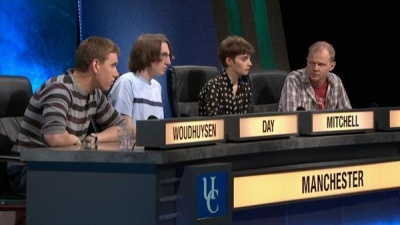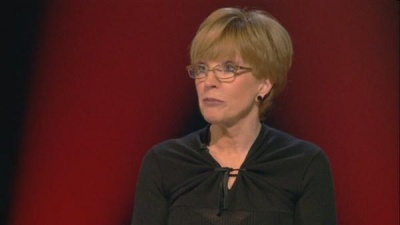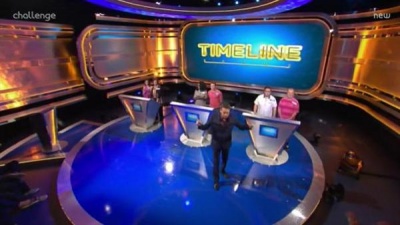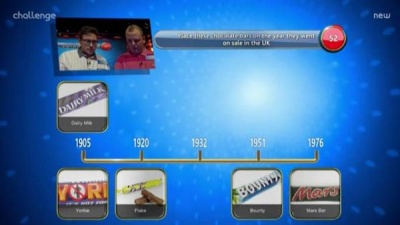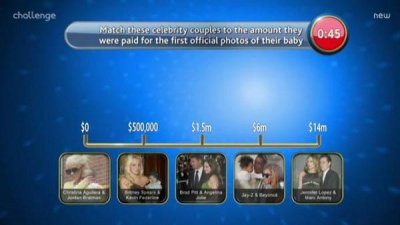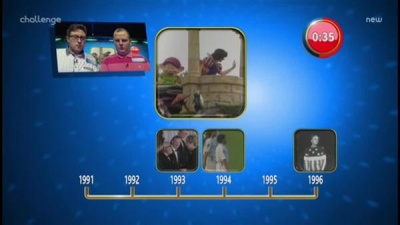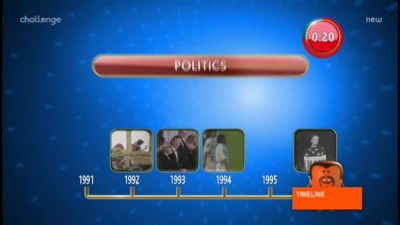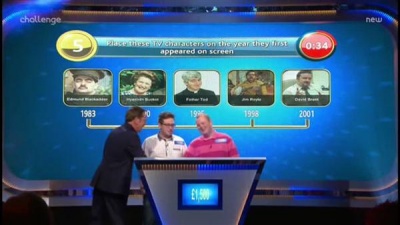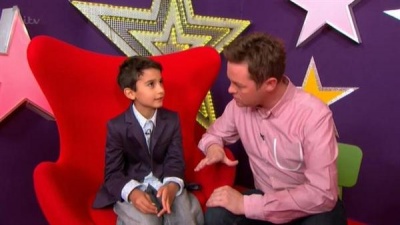Weaver's Week 2014-03-30
Last Week | Weaver's Week Index | Next Week
You've never seen a review like this! It's novel, it's here and nowhere else, and as we're about to begin this landmark review, you cannot possibly miss it.
Contents |
Timeline
Whizzkid Entertainment for The Challenge Channel, from 6 March
Unimpressive.
University Challenge
Group Phase 5, Match K: Trinity Cambridge v Manchester
Back in the mists of time, Manchester lost a match. It was at the very start of the group phase, and it was to Trinity Cambridge. Almost three months later, the sides meet again, with the winner heading for the final and the loser talking the walk of shame over the canal and into the wind.
Trinity hasn't lost to anyone, and they get the first starter, and bonuses on "Rule Britannia". Manchester prove more adept at unstable chemical elements, and recognise the start of The Waste Land when they see it. A 55-20 lead after the first visual round is trimmed after one of the Mancunians suggests the Mandelbrot set is an arrangement of circles. No: look closer.
Trinity gets a set of bonuses on ancient gods: they answer crisply, they answer confidently, and they answer wrongly. Two out of three ain't bad, but you get nothing for a pair – not in this game! Trinity briefly draws level, thanks to their knowledge of a good chuff. We pause for listeners to The Mary Whitehouse Experience to wipe their screen.
Trinity promptly loses parity from a missignal, and gains it back with knowledge of the roots of quadratic equations. Their route one approach to the game is to buzz early, buzz often, and let Manchester pick up the pieces. Manchester have a lot of pieces to pick up, and a lead of 115-75 after the audio round on British classical musicians.
How are Trinity going to pull this one round? Forty isn't an impenetrable lead, but Manchester get two more starters, a load of bonuses, and that advantage has motored up to eighty. They'll invoke The Bishop of Rome, only to be rewarded with a set of bonuses on things in the Manchester Art Gallery. C'mon, no need to show such an obvious home bias, unless there's a round on famous Trinitians later. The visual round are on paintings of Scottish writers, and Manchester's lead has been trimmed. A little. 155-120.
A question asks about the literary work linking the miller, the cook, the merchant, and the clerk. They're looking for The Canterbury Tales, but they'd surely have to have accepted The Chronicles of Trumptonshire: Windy Miller, biscuit maker Mr. Cresswell, salesman Mr. Dagenham, and town clerk Mr. Troop. First person who argues that Trumpton isn't a literary work is going to take a long walk in the Trafford Canal.
Manchester get a starter, and some spectacularly easy questions on French places. Trinity's next set is words formed from "winsome". Allowed 5% either way, and knowing 20% is wrong, a good strategist would not answer "25%". Never mind, Trinity get the next starter, and draw level with the bonuses.
Game on! Just over three minutes, and Trinity have the starter, and bonuses on scientific names of creatures, and a 20-point lead. Two minutes, Trinity get another starter and storm through with nicknames of prime ministers. 45 points ahead, slightly more than a minute, but Trinity are leaving nothing to chance. The parallelepiped gives them bonuses on the Electoral College (nine voters, the loser claims victory), before the time expires.
Trinity Cambridge have won, and won handsomely: 260-175. Even at three-quarter time, if we knew one side would win by 85 points, we'd have tipped Manchester to extend their advantage. Trinity's victory came on the bonuses, 28/37 is formidable work, eclipsing Manchester's 18/27. Understandably, the Cambridge side are exhausted and elated; the Manchester side merely exhausted.
Over five matches, Trinity has maintained a phenomenal bonus rate, totalling 138/205, slightly more than two-thirds. The two wins over Manchester will live long in the memory, but we reckon Trinity's best match so far was the 300-150 demolition of Christ Church Oxford in the first round back in July. CCO looked handy, and had enough knowledge to make 16/21 bonuses, but were repeatedly beaten on the buzzer.
Countdown Update
Since mid-February, Countdown has crowned ten champions, including the first octochamp of the year. It's not Brett Davids, who was defending champion when we last looked, and won three himself. No, Brett ran into Andy Naylor, and gave Andy the hardest match of his eight wins; 781 points includes four century scores, and he goes into finals week showing similar promise to Callum Todd last series. Of the players we've seen so far, he's the only realistic series champion.
This month, we've had Sean Connors (2 wins), Jay Preller (1 win), Joe Hammill and Ruth Erwin (2 wins each), and then came Cliff Lee. He has five wins, including two centuries, but we fear that his ability to submit words not in the dictionary, and preference to pick numbers games he can't solve, will scupper his chances for Finals Week. This week, Martin Ashmeade, Jonathan Worrall and Peter Cross won one match, as did Ann Robinson.
More from Countdown in early May.
Timeline (yes, we'll do it properly)
British Sky Broadcasting has many problems. One is that the promotions department are too good. They're practised in the dark arts of watching a boring programme, finding the fifteen seconds when something slightly interesting happens, and stringing those moments out so the programme looks decent. We take our hats off to these people, they are the miracle workers behind the company's success. They embody the KYTV ethos: bring enough people to a trough of mystery soft drink and some of them will imbibe.
Back at KYTV's sprawling studio complex in west London, it becomes clear that literally no expense has been spent on this programme. It's filmed in the KYTV Broom Cupboard, and if you look very closely behind the video screen you might just be able to see a mop scurrying out of sight. In his write-up at Bother's Bar, the intrepid Lewis Murphy noted that literally no expense had been spent on signs pointing out the studio entrance. Not even a hand-written sign saying "Way In", just in case they're visited by Mr. Rooney.
In the broom cupboard are seven people. One of them is the host, Brian Conley. It's a long time since we've seen Brian on our screens, we think not since Dirty Rotten Cheater in 2007. The other six are contestants, grouped into three pairs. They could be a married couple, or work together, or something along those lines. Brian begins the show by chatting amongst these groups, introducing them to the studio audience, and also to anyone watching at home. Arbitrarily, he picks on a pair to start the game.
Arbitrarily? Actually, no. There's an order-of-play question before this, a worked example of the "putting these things in order" concept for the particularly hard of thinking. But it doesn't go to air, in part because the buzzers are not going to be used again, and in part because even the KYTV audience knows how to put things in order. Most of them.
So the first team pick their category. It's a loose description, it might be misleading. Where they say "Chocolate", you can be reasonably sure you'll get a question on chocolate bars. Where they say "Football", you know the question will be about football, but will it be the foundation of clubs? Or their trophies? Or the dates various brands of ball were introduced? Or something completely different.
The team get their question, such as "Put these pictures of Jeff Spelling (host of Football Saturday on KYTV Sports) to their date." And the players will see five years, corresponding with five pictures of Jeff. Their task is to drag the pictures to the years, using their fingers and a touch-screen in front of them. There's a point for every picture in the right place. And then there's an ad break.
This is a strange place to put commercials. We've had seven minutes of faffing about and about a minute of game. It really breaks the flow: Brian judders to a stop, we tune out for five minutes, including some more of those remarkable KYTV promotions. When the programme finally resumes, Brian then has to remind us of the state of play when we're back. It's jarring, it's graceless, we already don't like it.
Still, while they're on a break, we'll fish around from some parish notices, adverts that no-one's paying us to write.
- The UKGameshows Burger Department reports how Nathan Dunn, a sometime Big Brother lab rat and perpetual chef of note, has moved his Northern Soul Food empire. He now sells high-quality burgers at The Kenton pub in Hackney. There's a launch event (and samples) this Wednesday evening.
Back at the game, the second and third team have their chances to match some events to the years. Behind the contestants is a big screen, this shows the audience in the studio what's happening on the players' screen. Viewers at home see this, and are also privy to a small picture in the corner of the screen. It shows the players head-on, from a little camera positioned in their podium, just above the screen. It also draws attention to that irritating channel name display that KYTV insists on putting in the corner.
At the end of this round, we move into round two. The team with the lowest score from round one gets first pick of three more nebulous categories, if there's a tie it's broken by the team that was faster or fastest to solve their initial puzzle. In round two, the questions are to put five things in number order, but it's not necessarily years. We might, for instance, be asked about celebrity babies, and to match the child to the amount of money paid to the parents for first pictures of the infant. Five options to choose from, one point for each in the right place.
Oh, crikey, another ad break.
- Remember DASH? The puzzle hunt played in cities across North America and in London? This year, it's back, it's bigger, and even more people will be there. So if you want the smug satisfaction of proving yourself smarter than this column, and you don't mind being beaten by folk from a show with a short name, gather some friends and join us on 26 April.
Back at Timeline (remember that?) Brian has to remind us of the situation, and who has played their second question already because that's not obvious from the scores. The other two teams have their go, and the players with the lowest score over the two rounds will leave us. They'll get a cheery goodbye and sincere thanks from the host, but no consolation prize. Not even a Timeline eggtimer (£15 from Sofa Shop — you spend, we send).
This would be a spectacularly good place for an ad break, while they reconstruct the set, removing one of the podia and reconnecting those little cameras because the USB leads have fallen out. Being KYTV, they're not going to have an ad break in a sensible place, they're going to cover it with an Eggheads-style wipe, and straight on with round three.
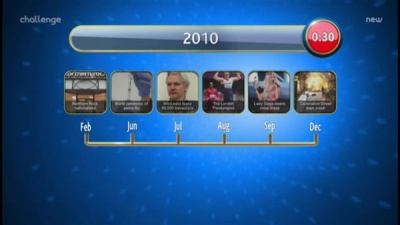 What happened in 2010? Iron Chef UK, for starters.
What happened in 2010? Iron Chef UK, for starters.
The lower-scoring team picks a year; there seems to be one from this century, one from the 1990s, and one from a bit further back. The round isn't likely to go past the late 1970s, because that would make it inaccessible to the advertisers' target audience of thirty- and forty-somethings. Six events are presented to the team, each attached to a month. Three of the events happened in that month in that year; three of the events happened in that month in a different year. Was the Northern Rock nationalised in January 2010, or in another year? Lady Gaga's meat dress was in September, but was that in 2010?
The team's task is to pick three of those events that didn't happen during the year in question, leaving three that did. Two points are awarded for each correct decision; it can quickly be seen that this is only ever going to award 0, 4, 8, or 12 points. There's clear room for improvement: the question could be, "At least two of these events happened during the year, and at least two happened in another year. Select the events that did not happen in 2010." Instantly, a more taxing puzzle.
After the first team has had their go: brace yourselves, it's yet another ad break.
- The Technical Difficulties podcast is publishing again, after an unusually long absence. This week, Tom and Gary and Matt and Chris go on a flight of fantasy about a penguin restaurant serving Italian food in the Antarctic. It's the sort of surreal bonkersness that Paul Merton would slowly walk backwards from. The Rusty Old Radio Times would note, "some references to bodily functions", we note that it's four young men chortling around a kitchen table.
Coming back, the second team have their last round, and a winner is declared. The final begins with five categories and six consecutive years. Behind each category is a clip – it could be a news clip, it could be some sports action, or one of the many films you can see on KYTV Cinema Movies. Each clip is associated with one of the years, and the team's task is to link the clip to the year. They're awarded £500 for each correct answer.
Wrong answers shoot across to the correct year, so the final category is always going to be a one-in-two guess: it pays to play the strongest category first. Just to add some slightly superfluous jeopardy to the final, it's against the clock. Our winners are rewarded with five seconds for every point they got in the first three rounds, plus 15 seconds for getting to the final. It's usually around 90 seconds, and rarely do they come close to running out of time.
Brian has one final question for the pair. "What's that irritating animated character doing in the bottom of my screen? Some of us have got a show to do, without you computer-generated maroon hiding one of the answers." Yes, such is the high regard in which KYTV holds its viewers that it's perfectly happy for the final question to be a choice between 1991 and Next Thursday At 9 It's More Timeline. We know it's the inferior option, but pardon us for wanting to watch the programme rather than the promotions.
Brian does have one final question, an optional double-or-quits question. The players are given the question, the answers, but not the options they would need to place. In this question, they would be allowed to test answers as often as they wanted until they got all five right; a score of "3" shows three are right and two are wrong. This all-or-nothing gamble is optional, but seems to generally get taken.
And that's the programme. Brian Conley is his usual cheerful self, entirely entertaining. The set is lit in a restful shade of orange for most of the game, turning into quite a lurid shade of green for the endgame; at no time does it go red or white, the dominant colours on game shows for far too long.
That's about as much as we can praise. The programme itself is unexciting: while the presentation is mildly novel, the concept isn't, and the question matter is trite and predictable. Worse, far worse, the show drags on. After trimming off all the ad breaks, we're left with a 42-minute programme. Trim down the recaps by putting ad breaks in more natural places and we'd be around the 38 minutes of Countdown. With a little editing, and ditching the double-or-quits round, they might be able to fit Timeline into a BBC half-hour slot.
The prize would fit into a BBC half-hour slot, too: around £2000 per episode. We can live with that as a BBC daytime prize. We can live with £5000 as the regular daily prize on an ITV daytime quiz like Tipping Point. For a primetime show, bankrolled by one of the richest production houses in the country, it's a derisory amount. KYTV wants to be treated like a major television studio, but it makes shows with absurdly stingy little prizes.
C'mon, Mr. Yellowhammer, your company is absolutely rolling in it. £500 will buy KYTV slightly less than 0.4 seconds of English football. A throw-in costs about as much as the top prize here. KYTV has set its priorities, and they don't include this programme.
Our over-riding feeling after watching two episodes was relief. "We never need to see this programme again," and that's far more negative than we're accustomed to.
This Week and Next
Big Star's Little Star returned this week. "What's Mummy's little secret?" asked Stephen Mulhern of one of the show's stars. "She doesn't really like Daddy," piped up the youngster. Cue fifteen seconds of the panel laughing with embarrassment, or squirming on their seats open-jawed with amazement. We were more entertained by that, and by Stephen's muted reaction, than by a whole hour of Timeline.
The last Brain of Britain semi-final had its key moment on the third question. Asked what was once known as Eoanthropus dawsoni, Mark Grant paused, deep in thought, then dredged the correct answer up from somewhere – Piltdown Man. It was the first of his five in a row, giving a two-point lead over Peter Watson. The advantage halved in the next round, and swung back by a point to Mr. Grant in round three as both leaders dropped their opening questions; Peter Almond made a run of his own.
Bonuses can help a player, but they won't win a game of Brain of Britain on their own. Mr. Grant scored three of his own set, picked up a hat-trick of bonuses from the others, and suddenly the lead had extended to six. Nothing much happened in round five, not even from the episode's fourth player Gareth Williams – his audio question (everyone has one) was a bunch of birds twittering. Mr. Almond had continued to score solidly, moving into second place, but needed a five of his own in the final round to stand much chance. He got two, Mark Grant had one, and – by three clear points – he will contest next week's final.
Nominations for the BAFTA Television Awards (Craft categories) are out. Best director (multi-camera) could be Phil Heyes (The X Factor), it could be Nikki Parsons (Strictly Come Dancing). Strictly will certainly win a Special Award for Craft; the annual Craft award could go to the Saturday Night Takeaway production team. Winners will be named on 27 April.
We'll have more from Stephen Mulhern next week as we finally get round to reviewing the Catchphrase revival. Until then, it's BARB ratings o'clock!
- The Eastenders takes position as television's top dog on 8.1m viewers. BBC The Voice nips at its heels with 7.7m for Sunday's Round Between The Battle Rounds And The Live Shows.
- 6.5m for Saturday Night Takeaway, and 4.35m for the returning Catchphrase. The Cube (3.65m) was comfortably beaten by Who Dares Wins (4.85m).
- University Challenge held off Sewing Bee, 3.2m to 3.05m. The Chase also took 3.05m viewers.
- Hair didn't quite beat The Taste head-to-head, but it was close – 910,000 for Steve and his snippers, 960,000 for the final of Nigella and her spoons.
- Celebrity Juice beat them both – 1.8m viewers makes it more popular than QI (1.65m) and 8 Out of 10 Cats (1.45m).
A quiet week for new shows, STV has The Lie (8pm Monday) and BBC1 has Have I Got News for You (9pm Friday). The grand final of Hair (BBC3, 9pm Tuesday) and Brain of Britain (Radio 4, 3pm Monday).
But what's that appearing next Saturday? Why, it's the final of BBC The Voice of Holland of UK (BBC1, 7pm), seeking link three in the most difficult Only Connect sequence ever. Over on Channel 4, civilian Fifteen-to-One returns at 5.15 and the "Bring Back Five Minutes to a Fortune" campaign begins at 5.55. Heads-up for next Sunday, when University Challenge The Boat Race has a 6pm throw-off.
Photo credits: Whizzkid Entertainment, Granada, Endemol / YTV, BBC Glasgow, 12 Yard.
To have Weaver's Week emailed to you on publication day, receive our exclusive TV roundup of the game shows in the week ahead, and chat to other ukgameshows.com readers, sign up to our Yahoo! Group.


